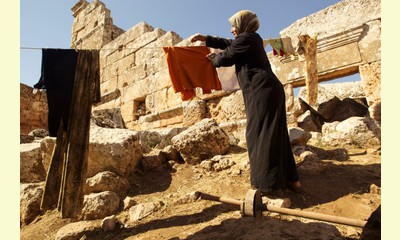|
|
Security Council resolution 2122: women's empowerment
un article par Phumzile Mlambo-Ngcuka, Director, UN Women (abridged)
When war erupts, women are often the first to
experience the harsh brutality and the last to be
called to the peace table. A resolution adopted
today by the UN Security Council moves us one step
closer to the full participation of women as
leaders for peace and security.

A Syrian woman hangs clothes to dry while taking shelter inside ruins she fled to in fear of shelling near Idlib on October 16, 2013. REUTERS/Loubna Mrie
click on photo to enlarge
By unanimous vote, the Council adopted a
resolution that sets in place stronger measures to
enable women to participate in conflict resolution
and recovery, and puts the onus on the Security
Council, the United Nations, regional
organizations and Member States to dismantle the
barriers, create the space, and provide seats at
the table for women. . . .
In many current conflict resolution processes,
such as those for Syria, Democratic Republic of
Congo, or Somalia, there have been few
opportunities for women to participate directly.
UN Women hopes that this new Security Council
resolution will trigger opportunities for women’s
direct engagement, setting priorities for recovery
in their countries.
There can be few better investments in building a
sustainable peace than involving women. They
connect the talks to the lives of those affected
by conflict. They help generate broad social buy-
in to the peace. UN Women therefore invests in
building coalitions of women to influence
negotiations.
Last year in Mali, for example, after women were
routinely targeted when extremist groups took over
the northern part of the country, resulting in
rape and the removal of women from public office,
women were told to stay out of public space. With
men fleeing from attacks and forced recruitment to
rebel forces, women were left to head households
with no means of seeking water or food, or of
reaching to the outside world for help.
This story is not unusual. Nor is what happened
next. Women across Mali demanded inclusion in the
conflict-resolution efforts that began immediately
in nearby Burkina Faso. In response, UN Women
began convening huge meetings of women from civil
society and government leaders from across the
country to set out their own priorities for peace
and demand a space at the peace table.
UN Women arranged for four women peace leaders to
fly to the peace talks in Ouagadougou. Without an
invitation, they walked into the talks and raised
the alarm about the attacks against women and
girls and the dire situation facing them in
refugee camps and in towns occupied by armed
forces. They demanded inclusion in efforts to
stop the fighting so their needs could be
addressed and their human rights protected.
Security Council resolution 2122 spells out
specific measures to protect women’s rights,
including their right to sexual and reproductive
health. It outlines measures so that delegations
to peace talks, post-conflict national leaders,
peacekeepers, mediators, foreign ministers and
their staff, put into action the commitments set
out in Security Council resolution 1325, the first
one calling for women’s engagement in conflict
resolution, adopted thirteen years ago. . . .
[Note: Thank you to Janet Hudgins, the CPNN reporter
for this article.]
|








|
DISCUSSION
Question(s) liée(s) à cet article:
UN Resolution 1325, does it make a difference?,
* * * * *
Commentaire le plus récent:
A recent study by the NGO Working Group on Women, Peace and Security is critical of the UN Security Council for its inconsistent implement of Resolution 1325 that calls for an increased role of women in peacekeeping and peacebuilding. The full report is available on the Internet on the website of womenpeacesecurity.org.
The working group members are an impressive group of active international NGOs: Amnesty International; Consortium on Gender, Security and Human Rights; Femmes Africa Solidarité; Global Action to Prevent War; Global Justice Center; Human Rights Watch; The Institute for Inclusive Security; International Action Network on Small Arms; International Alert; International Rescue Committee; Refugees International; International Women’s Program of the Open Society Foundations; Social Science Research Council; Women’s Refugee Commission; Women’s Action for New Directions; Women’s International League for Peace and Freedom.
Here is the report's Summary of Findings
General trends in the Council over the last 12 years have shown significant development, including in the language and expertise on women, peace and security in resolutions, more expertise available to deploy in terms of gender advisors and women, peace and security, and a more sophisticated understanding of the key issues at the root of this agenda. There is a better understanding of, for example, what it takes to have disarmament, demobilization, and reintegration processes that are responsive to women; security sector reform that is responsive to women; and post-conflict elections that support women candidates and women voter. However, there is inconsistency in the Council’s deployment of that knowledge. There is still a significant disconnect between the content of reports received by the Council, meetings the Council holds, and resolutions it adopts.
There have been a number of positive developments in the Council’s use of women, peace and security-specific language in its policy over the last year. For the first time, for example, the Council used women, peace and security language in its resolution on Cyprus. However, there have also been inconsistencies. The Council’s initial lack of support for women in September 2011’s resolution on Libya was rectified by strong support in its March 2012 renewal. . ... continuation.

|
|









